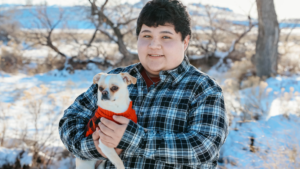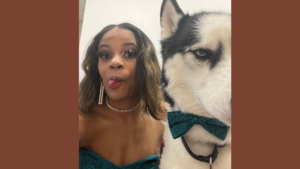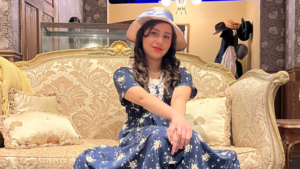This guest post is by Abigal Farnsworth, a young woman who is diagnosed with autism and is attending Ashland University. Abigal is applying for the Spring 2024 Making a Difference Autism Scholarship via the nonprofit KFM Making a Difference started by me, Kerry Magro. I was nonverbal till 2.5 and diagnosed with autism at 4, and you can read more about my organization here. Autistics on Autism: Stories You Need to Hear About What Helped Them While Growing Up and Pursuing Their Dreams, our nonprofit’s new book, was released on March 29, 2022, on Amazon here for our community to enjoy featuring the stories of 100 autistic adults.
| No matter who you are, growing up with Autism is challenging. But when you are a girl, it is arguably more difficult due to a lack of diagnosis. Boys with Autism tend to be very loud, disruptive, and often display obvious signs that they are “different”. Because they stand out, they are likely to be diagnosed at a young age. For girls, the exact opposite is often true. Like boys, girls with Autism struggle to understand appropriate behavior in different social situations. Yet instead of being loud and disruptive, girls often withdraw and are labeled as shy or introverted. Because they are not acting out or causing trouble, they are much less likely to be diagnosed at an early age.
I was not diagnosed with Asperger’s / ASD until I was seventeen years old, and in my senior year of high school. This was not because I did not display signs at an earlier age, but because no one recognized them. I knew I was different, but had no idea why. I remember how passionately I hated school as a young child. My grandma used to say that I cried every single day on my way to kindergarten, and I believe it. I was unable to make friends, and could not connect with children my own age. On top of that, I hated being away from my parents. To make matters worse, like many kids with Autism, I developed slightly slower than other kids. I was unable to do some basic tasks, like tying my shoes, that other kids my age were all doing. This made me very insecure. When I was in second grade, I finally learned how to tie my shoes. I went to school the next day very excited to tell my teacher. She replied, “Oh, I thought you already knew how to do that.” That made me even more insecure. Third grade was even worse. Where I live, this is the age at which children are tested to determine if they qualify to be in the “gifted” program at school. I desperately wanted to participate in this program. I was devastated when I did not qualify and was deemed not smart enough to join their special club. This “failure” made me believe that I was not only awkward and unpopular but also dumb. For an insecure child, this was the worst possible combination of things I could be. I hated school. It felt as though the teachers only cared about the “gifted” students, and not “regular kids” like me. Fourth grade was when things took a turn for me. Until then, I went through school with passing grades, but nothing outstanding. I simply had no interest in learning. Not being accepted into the gifted program had crushed me. But one day in fourth grade, I started reading a book that I loved. My reading level shot up from elementary level to high school level in a matter of months. My teacher was baffled, because no one thought I was capable of this. One day, she took me out in the hallway and asked me how I had made this remarkable jump, and I told her, “I finally found a book that I love.” This was the turning point when I realized that I was not dumb, I just had not developed in the same way as other kids. I found myself motivated to do well in school, and my grades began to improve. Even though I gained a love for learning, the social aspect of school did not get any easier. The first two years of middle school were an absolute disaster for me. I suffered from extreme bullying and harassment, and had no real friends brave enough to stand up for me or help me. In the middle of seventh grade, my parents transferred me to a different school to allow me a fresh start. From then on, I had a very small group of friends. I still was not popular, but that did not bother me. What I cared about was succeeding academically. When the COVID-19 pandemic struck, everything came to a sudden halt. Schools closed, and I lost the few friends I thought I had. For months and months we were stuck at home. I discovered a new passion…writing. In less than three months, I completed the manuscript for my first novel, EverGreen, and began actively searching for a publisher. With the help of my mom, I sent over one hundred individually customized query emails to publishers and agents, asking them to consider my book. Most of them did not reply, but persistence paid off and eventually, I got the answer I was looking for. Less than a year after I started writing, I signed a contract with a traditional publisher, World Castle Publishing. Today, I have nine published books. A tenth one is set to be released later this month. Like many people with Autism, I am particularly gifted at one specific thing. For me it is not math or science, but writing. This is the easiest way for me to express my emotions, and it helps me connect with the world in a way that works for me. Finding my gift as a writer changed my life; it provided a way to define myself with a talent that others recognize and appreciate. Growing up with Autism is not easy, especially when you are undiagnosed. That is why I am a strong advocate for Autism awareness, and teaching people about how the signs of Autism may present very differently, particularly in girls. Advocacy and education about Autism are the stepping stones to recognition and diagnosis of those affected. Diagnosis leads to understanding, acceptance, and access to supportive resources. Acceptance as unique, valued individuals coupled with inclusion in the daily interactions and activities of life is what all people, with or without Autism, yearn for. We need to work together to advocate, educate, and make this a reality for those with Autism. Follow my journey on Facebook, my Facebook Fan Page, Tiktok, Youtube & Instagram. My name is Kerry Magro, a professional speaker and best-selling author who is also on the autism spectrum. I started the nonprofit KFM Making a Difference in 2011 to help students with autism receive scholarship aid to pursue post-secondary education. Help support me so I can continue to help students with autism go to college by making a tax-deductible donation to our nonprofit here. Autistics on Autism: Stories You Need to Hear About What Helped Them While Growing Up and Pursuing Their Dreams was released on March 29, 2022 on Amazon here for our community to enjoy featuring the stories of 100 autistic adults. 100% of the proceeds from this book will go back to our nonprofit to support initiatives like our autism scholarship program. In addition, this autistic adult’s essay you just read will be featured in a future volume of this book as we plan on making this into a series of books on autistic adults.
Your 2024 Making a Difference for Autism Scholarship Application is now live |














